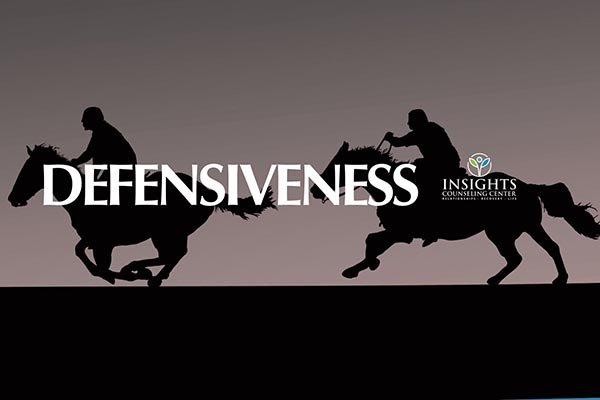Defensiveness: Why “It’s Not My Fault” Might Be Making Things Worse
Part 3 of the Four Horsemen Series
Most of us don’t like being accused of something—especially when we feel misunderstood or unfairly blamed. In those moments, defensiveness can feel like the natural response. It’s the emotional equivalent of crossing your arms and saying, “That’s not fair!”
But while it may be instinctive, defensiveness almost always backfires. Instead of protecting the relationship, it tends to prolong arguments, escalate tension, and leave both partners feeling more alone. In the Gottman Method, defensiveness is one of the Four Horsemen—a pattern that predicts relationship distress if left unaddressed.
The antidote? Taking responsibility, even for a small piece of the problem. It may feel counterintuitive, but it’s one of the quickest ways to de-escalate conflict and create space for connection.
What Defensiveness Sounds Like
Defensiveness can take many forms. You might recognize it in phrases like:
“That’s not what happened.”
“You’re making a big deal out of nothing.”
“Well, you do the same thing all the time.”
It might come out as a counterattack (“Oh really? Let’s talk about what you did last night.”), or as playing the victim (“I guess I can’t do anything right around here.”).
Underneath, defensiveness is usually a strategy for self-protection. We feel accused, and we try to deflect the blame. But in doing so, we often reject our partner’s reality and miss the deeper emotional bid behind their complaint.
Why Defensiveness Hurts
When one partner is trying to share something painful and the other immediately deflects, the conversation shuts down. Defensiveness blocks empathy. It tells your partner, “Your perspective doesn’t matter.”
This often leads to a cycle where:
One partner brings up a concern.
The other gets defensive.
The original partner escalates or shuts down.
Both walk away feeling unheard and stuck.
It’s a loop many couples know too well. But there’s a better way.
The Antidote to Defensiveness: Taking Responsibility
The Gottman antidote to defensiveness is simple but powerful: own your part. Even if you don’t agree with every detail your partner is sharing, you can still take responsibility for your role in the dynamic.
That might sound like:
“You’re right—I forgot, and I can see how that was frustrating.”
“I didn’t realize how much that bothered you. I’ll work on being more mindful.”
“I was distracted earlier, and I missed what you were trying to say. Let me try again.”
This doesn’t mean you take the blame for things you didn’t do. It means you approach the conversation with openness and curiosity, instead of defensiveness and dismissal.
Use the Gottman Softened Start-Up Formula to Invite Responsibility
If you’re the one bringing something up, how you start matters. A softened start-up creates the space for your partner to respond without getting defensive.
Use: “I feel ___ about ___ and I need ___.”
And if you’re on the receiving end, try responding with:
“I hear you.”
“That makes sense.”
“I can take responsibility for that part.”
Even acknowledging a small part of the issue is enough to begin shifting the tone of the conversation.
Try This at Home
Next time your partner shares a frustration, see if you can do three things:
Pause before reacting.
Notice if defensiveness is rising—and breathe.Look for the truth.
Is there any part of what your partner is saying that you can take responsibility for?Respond with ownership.
It doesn’t have to be dramatic—just honest.
For example:
“I didn’t realize I was doing that, but I can see how it landed that way.”
“Thanks for pointing that out. I want to do better.”
These moments of ownership are the building blocks of trust.
What Changes When You Take Responsibility?
When couples begin replacing defensiveness with accountability, the entire emotional tone shifts. Arguments become conversations. Walls come down. Repair becomes possible.
And the beautiful thing? Taking responsibility tends to invite your partner to do the same. It’s a turning point that can soften even the toughest cycles of conflict.
Want Support Breaking Out of the Defensiveness Cycle?
If defensiveness is keeping your conversations stuck, we’re here to help. Our Gottman-trained couples therapists can support you in building emotional safety, healthy communication, and mutual accountability. Reach out today to begin the work together.

